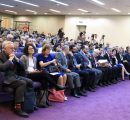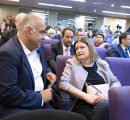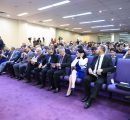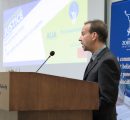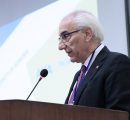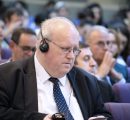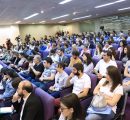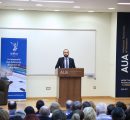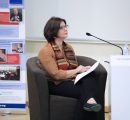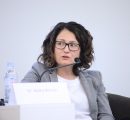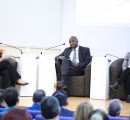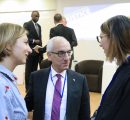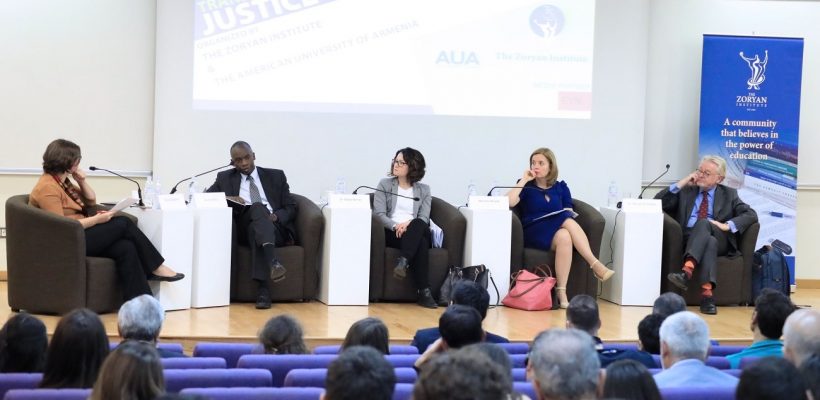
International Symposium on Transitional Justice & Launch of the Human Dignity Fund
4 min readYEREVAN, Armenia ‒ On October 5, the International Symposium on Transitional Justice, organized by the Zoryan Institute in collaboration with the American University of Armenia (AUA) took place in Yerevan in front of a packed audience. The objective of the symposium was to provide a space for both the public and policymakers to learn about the concept of transitional justice and how it might apply to Armenia. Some of the world’s leading scholars and experts were invited to Yerevan by the Zoryan Institute to share their knowledge about this relatively new concept in international law that has been utilized by numerous countries in transition.
The EVN Report was the media partner for the symposium.
In his welcoming remarks, AUA Provost Dr. Randall Rhodes said, “Today, you will hear from speakers who, based on their scholarship and research will provide a theoretical framework and case studies for the contextualization and implementation of transitional justice.” He explained how this discourse is critical for Armenia as it addresses its past and designs a roadmap for its future.
K.M. Greg Sarkissian, President of the Zoryan Institute, said, “We are here today to promote intellectual discourse around the concept of transitional justice through an academic perspective, devoid of any political motivations.” Sarkissian explained how this symposium, much like the Institute’s projects of the past, demonstrates a core value of the Institute: that education can empower through facts, references, analysis and perspectives. He closed by announcing the establishment of Zoryan Institute’s “Human Dignity Fund” with an initial contribution of 37 million AMD ($100,000 CDN) for the purpose of organizing academic symposiums.
“It is my hope that with the help of symposiums like today’s, and Human Dignity Fund Armenia, we can help build a country where people want to live, a country where they will be happy and have their dignity.”
In his opening remarks, First Deputy Prime Minister Ararat Mirzoyan spoke about past abuses, voter fraud, attacks against peaceful protesters and the systemic violation of people’s rights, including widespread corruption and illegal enrichment by many in the state apparatus. He noted that following the Velvet Revolution, authority has been returned to the people and added that the “current judicial system is not capable of addressing these institutional and systemic challenges.” Remarking that Armenia transitioned from a quasi-democratic to democratic system, the need for transitional justice is clear and that it would be implemented in accordance with the country’s Constitution and in accordance to the international responsibilities Armenia has.
Following the opening remarks, the panelists were invited to take the stage to present their areas of expertise.
The main rapporteur of the symposium Prof. William A. Schabas, renowned international human rights and criminal law expert and member of Zoryan Institute Board of Directors, opened his comments by emphasizing that “there is a quarter century of transitional justice experience, practice and reflection which [Armenia] can rely on to inform and develop its own unique and innovative approach to transitional justice.” He went on to say that transitional justice “is about discretionary choices ‒ for the victims to see that justice is done, but it’s also about building something new.” As an example, he mentioned that in some cases of transitional justice “compromises were made in exchange for the former regime giving up power.”
Marieke Wierda, Esq., a lawyer who specializes in transitional justice, focused her presentation on the social contract being integral to the rebuilding of social trust, because it reaffirms the rule of law and noted that at the heart of reparation is public consultation and national dialogue. In this, the role of civil society and the media is integral, Weirda noted. She further emphasized the importance of incentive-based systems versus investigative processes in uncovering the truth, arguing that this yields stronger results in rebuilding the social contract. Wierda said that “the question is not if transitional justice will work; it is how do you make it work for you ‒ and what is necessary to build a process that works for [your nation].”
Dr. Nadia Bernaz, discussed transitional justice through the framework of corporate accountability. She stated that in “many transitional justice situations, the public and private sectors overlap considerably.” Dr. Bernaz argued that institutional reform is a central issue, but perhaps the most delicate within the scope of transitional justice. The private sector is an economic force that is integral to the future success of a country, and so institutional reform must carefully strike a balance of encouraging corporate accountability without threatening the nation’s economic development. She also noted that corporations rarely have impact on human rights without the involvement of the state. “Transitional justice involves four components ‒ justice, truth, reparations and institutional reforms. When it comes to corporate accountability the emphasis of transition justice is put on the truth component,” Bernaz said.
Barney Afako, Esq., a lawyer with experience in conflict mediation and who has worked in the fields of human rights, refugee law, criminal justice and transitional justice issued in several countries shared his knowledge and experience in conflict mediation, drawing on mainly East African examples. Afako argued that young countries implementing transitional justice must incorporate a “strong element of vigilance and [ clear priorities ],” as this process is fundamental to state-building and nation-building. He emphasized that one method is to examine the past by way of inquiry. By acknowledging mistakes of the past, a country can avoid these same violations in the future.
Following the presentations by the panelists, moderator Sara Anjargolian, Esq., posed questions to the speakers and also presented queries from the audience and those following the livestream of the symposium. The questions ranged from how transitional justice tools can lead to ensuring accountability, serving justice and achieving reconciliation to how it can help with asset recovery to where transitional justice has not worked. The central message delivered by the panelists was that Armenia needs to take its time if it decides to utilize transitional justice, that reaching political divides to strike a balance between accountability and reconciliation was integral to the process and that Armenians need to be innovative and find their own interpretation of transitional justice that will work for their country.
Founded in 1991, the American University of Armenia (AUA) is a private, independent university located in Yerevan, Armenia, and affiliated with the University of California. AUA provides a global education in Armenia and the region, offering high-quality graduate and undergraduate studies, encouraging civic engagement, and promoting public service and democratic values.
Media Coverage:

